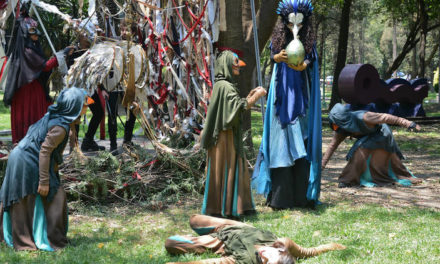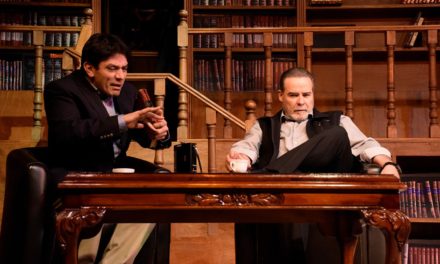The Game We All Play is composed of a series of sketches that have comedic, tragic, and even melodramatic undertones, but which mostly parody all of these genres. Perhaps because of its irreverent tone—but also because if makes the actors as well the audience reflect upon their respective lives and the current political circumstances—the piece has been performed intermittently all over Mexico, and especially by university students, since its debut in the 1970s.
Producer Jesús González was part of the cast directed by Gonzalo Correa in the 1970s and functioned as an assistant director of an adaptation in the mid-1980s. Almost forty years later, spurred by Ximena Marín, he was encouraged to bring back to the stage the creation of Chilean-French film and theatre director, screenwriter, playwright, actor, mime, author, poet, producer, composer, musician, comics writer, and spiritual guru Alejandro Jodorowsky.
In the creation of his “non-play,” Jodorowsky was inspired by the psychoanalytic studies of Eric Fromm and Eric Berne and in particular, their respective books The Art of Loving (1956) and Games People Play: The Psychology of Human Relationships (1964). Jodorowsky first directed the play in Mexico City which included renowned film and television actors such as Juan Ferrara, José Alonso, Alma Muriel and Macaria. While these names may not resonate outside Mexico, when set next to world figures with whom Jodorowsky has interacted—such as John Lennon, mime Étienne Decroux, playwright Fernando Arrabal, spiritual trainer Oscar Ichazo, and artist Salvador Dalí—their significance increases.
Jodorowsky did not consider his work a play, but rather a happening, which allowed him to combine philosophy, psychology, science, and art. He had scientists expounding philosophical theories about certain lacks in human beings, hippies singing, and artists ruminating about science. His interest in surrealism and absurdism may well account for his resistance toward narrative plays.
As a reviewer of a staging in Puerto Vallarta, Jalisco has noted, the dynamism of this non-play grabs the audience’s attention from the beginning and forces everyone to reflect about their fears, doubts, and the games we engage in every day. It forces us to examine how our cowardice keeps us from standing up for our beliefs and for what we love.
In his 2016 version of The Game We All Play, director Rodrigo Mendoza Millán, leaves out topics which are outdated and includes current twenty-first century concerns. Homosexuality, for example, which was a taboo topic on a 1970s stage, figures nonchalantly this time around. For Mendoza, the game players are average human beings from all walks of life. Thus, it is easy for the audience to identify with one or more of the characters. There’s the sick person hoping to get well, the politician waiting to join the annals of history, the communist wishing for a worldwide revolution, the bureaucrat expecting a salary increase, the business person waiting to become a millionaire, the professor looking forward to being asked to be a dean, the devout awaiting paradise, etc. These dramatic situations, along with others, remind us that we all are waiting for problems to be resolved, instead of realizing that the solutions are within us.
The non-play calls for characters in their early thirties. Supposedly by then individuals have reached full-fledged adulthood and have a different understanding of how the world operates. At this stage in life, adults pose more existential questions, have a deeper need for spiritual growth, and are hopefully mature.
Because the playwright shows the reality lived by human beings as well as the ideal state in which they should be living, the performance gives us the opportunity reflect on our condition and behavior. It is effective because in addition to stating a problem, it also offers various scenarios that provide the audience with multiple solutions, including spiritual and psychological ones. This creates the possibility to reflect and to look for answers within rather than outside ourselves, which leads to the acknowledgment that we are part of the world we wish were better.
According to director Rodrigo Mendoza, the play continues to interest Mexican audiences because of “the need we all have to be entertained and to be distracted, especially now that our country is like a pressure cooker about to explode.”
Playwright: Alejandro Jodorowsky
Director: Rodrigo Mendoza Millán
Cast: Daniela Luján, Luis Lesher, Damyanti Quintanar, Axel Santos, Perla Encinas, Sergio Suárez, and others
This post was written by the author in their personal capacity.The opinions expressed in this article are the author’s own and do not reflect the view of The Theatre Times, their staff or collaborators.
This post was written by Margarita Vargas.
The views expressed here belong to the author and do not necessarily reflect our views and opinions.


















